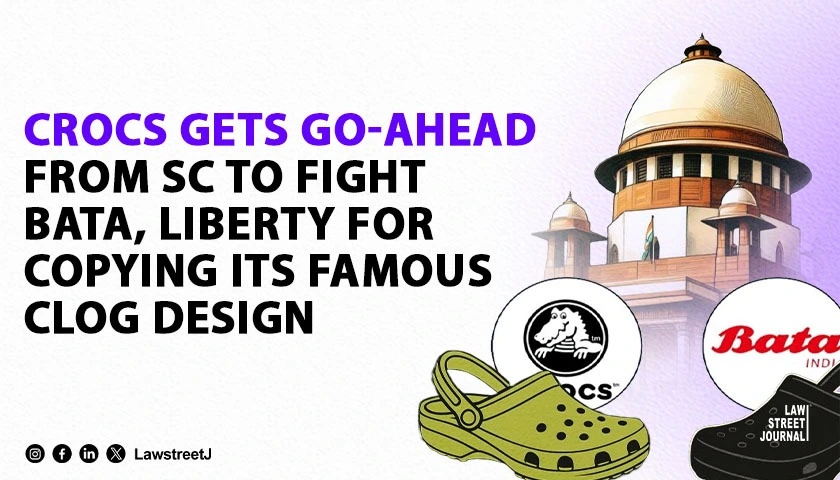New Delhi: The Supreme Court has delivered an important procedural ruling in favour of Crocs Inc. USA by dismissing petitions filed by major Indian footwear manufacturers, including Bata India and Liberty Shoes, thereby affirming a July 2025 Delhi High Court judgment that restored Crocs’ passing-off suits for trial before a single-judge bench.
A Bench comprising Justice Sanjay Kumar and Justice Alok Aradhe declined to interfere with the High Court order, noting that the Division Bench had only restored the suits for adjudication and had not granted Crocs any substantive relief. The dismissal of the Special Leave Petitions extended to those filed by Relaxo Footwears Ltd., Action Shoes (and Action Footwears), Aqualite Industries, and Bioworld Merchandising.
“We are not inclined to entertain this plea. The Delhi High Court has merely restored the suits for consideration by the trial court. We, however, make it clear that the trial court of the learned single judge shall consider the matters uninfluenced by any observations made by the Division Bench or by the dismissal of these SLPs. Question of law kept open,” the Court held.
Significantly, the Supreme Court stated that the “question of law [is] kept open,” deferring a determination on the central intellectual-property issue: whether a passing-off action under common law can be simultaneously pursued for product features that are or were protected under the limited-term framework of the Designs Act, 2000. The Bench directed the trial court to consider the matter “uninfluenced by any observations made by the Division Bench or by the dismissal of these SLPs.”
The litigation stems from six suits filed by Crocs Inc. USA alleging that Indian manufacturers had copied the distinctive shape, configuration, and perforated appearance of its foam clogs. Crocs asserts that these characteristics constitute its trade dress/shape trademark, and that the defendants are misleading consumers and exploiting Crocs’ global reputation and goodwill.
In February 2019, a single judge of the Delhi High Court dismissed all six suits, holding that Crocs could not use a passing-off claim to extend monopoly rights over design features already protected under the Designs Act. In July 2025, however, a Division Bench comprising Justices C. Hari Shankar and Ajay Digpaul reversed that decision.
The Bench held that a passing-off action is maintainable even where the trade dress overlaps with a registered design, provided Crocs can show that its claim is not based solely on copying the registered design. The Court reiterated that passing off is a sui generis common-law remedy aimed at protecting goodwill built through use.
Bata and Liberty challenged this revival before the Supreme Court. Senior Advocate Neeraj Kishan Kaul (for Bata) and Advocate Saikrishna Rajagopal (for Liberty) argued that allowing the suits to proceed grants Crocs a “dual monopoly,” enabling perpetual protection of its design beyond the statutorily limited protection of a maximum of 15 years. They contended this would result in “evergreening” of monopoly rights. Liberty also submitted that the Division Bench misapplied the Delhi High Court Full Bench ruling in Carlsberg Breweries A/S v. Som Distilleries and Breweries Ltd., which requires a plaintiff to demonstrate “something more” to maintain a passing-off claim. They argued further that Section 2(d) of the Designs Act, which excludes trademarks from the definition of “design,” and the ruling in Mohan Lal v. Sona Paint & Hardwares were overlooked.
Appearing for Crocs, Senior Advocate Akhil Sibal submitted that the two remedies are distinct: design infringement is a statutory right, while passing off protects common-law goodwill generated since 2004. He emphasised that the Designs Act contains no provision barring passing-off actions and that Crocs must be permitted to lead evidence of the distinctiveness it has acquired.
With the Supreme Court’s order dated 14 November 2025, the suits now return for trial.
Case Title: Bata India, Liberty v. Crocs Inc. USA















